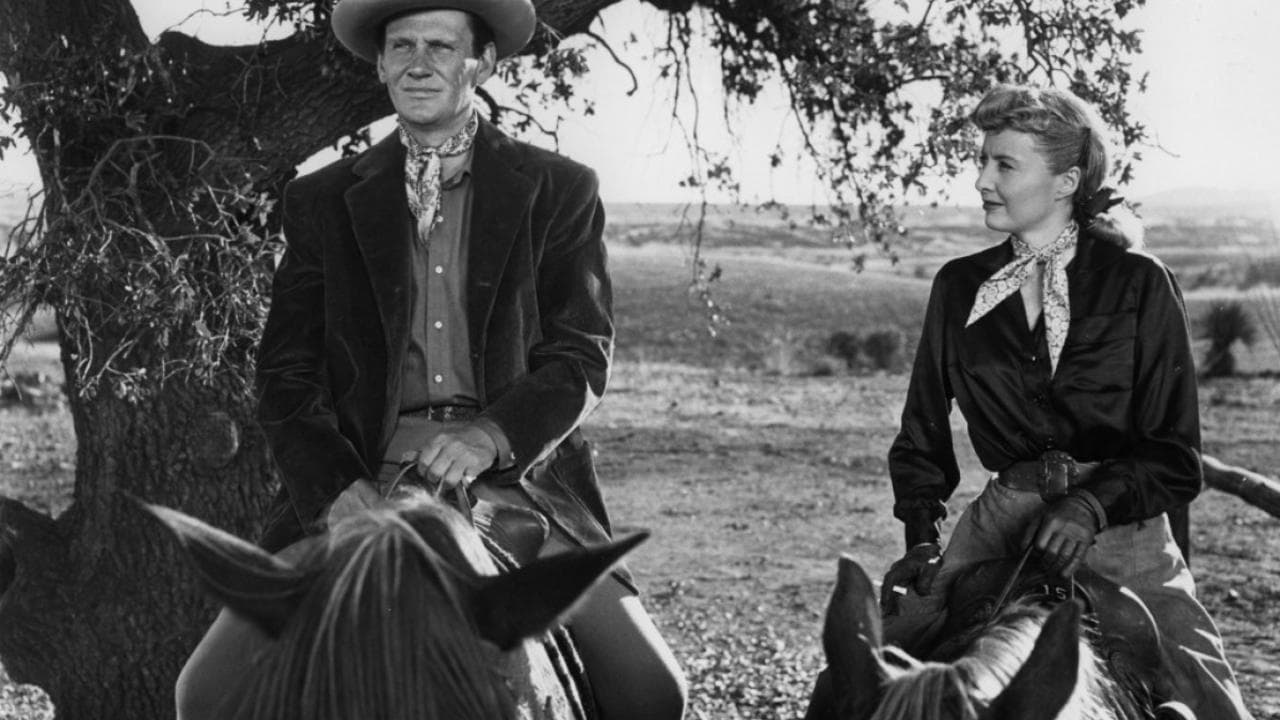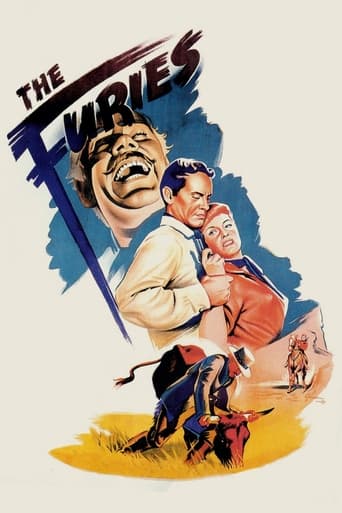

Barbara Stanwyck here... Barbara Stanwyck there... Barbara Stanwyck, Barbara Stanwyck everywhere.(Sheesh!) I honestly can't say that I've ever been very impressed with Barbara Stanwyck as an actress.But, after having to put up with her here (as the Vance Jeffords character) as she completely dominated this Western (and dragged it down to the level of being a snivelling, petty Chick Flick), I now loathe her with an undying passion like no other.Personally, I think that director Anthony Mann made a monumental error by allowing Stanwyck's spoilt, vain, rich-girl character to completely take control of The Furies' story.With its excellent location shooting and A-1 camera-work, this Western certainly had a lot of potential to be a really first-rate tale, focusing in on T.C. Jeffords (Vance's father), an arrogant, demanding cattle baron.Set in New Mexico (in the 1870s) - Instead of The Furies being a rough and tough Western yarn, it was all frills and lace with the two-faced, treacherous, spiteful Vance Jeffords forever appearing in one ridiculously expensive gown after another. (Talk about being a total clothes-horse!) I'm certainly pleased and relieved to know that with all of the subsequent Westerns that Mann directed throughout the 1950s, he thankfully kept the tone of his pictures totally masculine and rugged, sans Barbara Stanwyck.
... View MoreBarbara Stanwyck has some serious daddy issues in this weird cross between a women's picture, western and film noir from 1950.Walter Huston plays the daddy, and he steals the show in a vibrant performance. He owns a ranch called The Furies, which he hands over to his daughter when he tires of the daily management. But things go awry when he brings home a new wife from the city (Judith Anderson, excellent) and she has some ideas of her own about how things should be run. Tensions boil over to the point where father and daughter hate each other, and Stanwyck hatches a scheme to bankrupt her father and take the ranch away from him.It's an uneven movie at best. Characters seem to turn on a dime -- Huston and Stanwyck go from idolizing one another to hating each other back to idolizing each other -- but maybe that's the point. They're both ruled by their passions, and those passions extend to the father/daughter relationship, and sometimes confuse it, as much as to their business practices.Anthony Mann provided the noirish direction, and Franz Waxman delivers a frenzied, out-there score.Grade: B+
... View MoreThis one just keeps pulsating and bringing on the goods. Another of author Niven Busch's psychological westerns (preceded by "Duel in the Sun" and "Pursued"), this one has a dynamic father/daughter duo, a pretty and meek son (the late John Bromfield), and a smooth gambler seeking revenge for the death of his father. In fact, most of the characters are seeking revenge at one point or another---though the "Furies" of the title is the name of the contested ranch, in fact it could just as well refer to the motivations behind many of the characters' actions. Knockout score and photography and acting. Astounding that this one is not commercially available.
... View MoreVery few westerns have the psychological impacts that this "Mourning Becomes Electra" like saga dramatizes. Barbara Stanwyck, in the role that must have influenced her "Big Valley" character for TV, is both tough and tender as Vance Jeffords, the western princess of TC Jefford's (Walter Huston) empire. Dare step on her toes, and you won't be able to rest, as love interest Wendell Corey finds out. And dare come between her and her beloved father, and you'll end up with a surprising bit of vengeance as Judith Anderson as a gold-digging San Francisco socialite finds out. John Bromfield appears briefly as Stanwyck's brother who knows that he will never have the affections of his father that Stanwyck has and pretty much resigns himself to the fact that she will be daddy's heir, not him. Barbara Stanwyck was the Queen of the west, and in almost a dozen Westerns, it was Barbara Stanwyck who gave many a western hero a run for their money. Walter Huston, as her patriarchal father, is a force to be reckoned with who has trained his daughter to be tough. When he betrays her one wish, he also becomes a victim of her vengeance. There are also Gilbert Roland as a Mexican squatter, her life-long friend who becomes a tool in her father's revenge against her; Blanche Yurka, the great Hungarian stage actress, plays the bit role of his vengeful mama; Even in the small role, we are reminded of her excellent performance as Madame DeFarge in the Ronald Colman version of "A Tale of Two Cities" years before. Just watch her intense eyes as she cackles and curses in Spanish as she pushes huge boulders off the mountain in her effort to prevent Huston and Stanwyck from gaining access to the family's mountain hideaway. Beaulah Bondi also shows up briefly as a society matron who aids Stanwyck in her efforts to take over the Furies. With all this talent, it is amazing that the scenery wasn't eaten up along the way. The great Judith Anderson, who played many of the types of roles on Broadway that Stanwyck did on screen, is subtle as she tries to worms her way into the role of Queen of the Furies, but it is Stanwyck's ultimate revenge which prevents this from happening. Later, when we get our last glimpse of the beaten Anderson, she gives herself a great exit line. This, ironically, was the second film in which one of Stanwyck's characters had an impact on Anderson's character; In the 1946 film noir, "The Strange Love of Martha Ivers", it is young Martha (who as an adult is played by Stanwyck) who pushes matriarch Anderson down some stairs to her death, giving that film its motivations.The one problem with this casting is the performance of Wendell Corey, perhaps one of the dullest leading men in Hollywood history. Stiff and unappealing, there is no doubt in the viewer's mind that Stanwyck would never feel any passion for the tree trunk like character. He was perfect as the sap husband of Joan Crawford's in the same years "Harriet Craig" but didn't have the fire that Gilbert Roland did. The previous year's "The File of Thelma Jordan" paired them together and proved that Stanwyck's passion required her to have a man on her side (and in her bed) that was her equal. Fortunately, Walter Huston is given more screen time, and is absolutely outstanding. He truly deserved an Oscar Nomination for his lively performance. When T.C. faces his final moments on-screen, he does it with such acceptance of his fate that it is truly heartfelt. It was his last film, as he died before the film was released. Stanwyck praised Huston publicly, and at her AFI tribute, Walter's son, director John Huston, praised Stanwyck (whom he had never met) for her professionalism and kindness to his father. The same year's "September Affair" took Huston's old recording of "September Song" and utilized it to great effect. Even by only being heard in that film, he truly made a huge impact, and ranks as perhaps my favorite actor of old Hollywood.
... View More